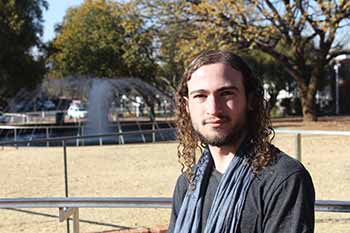Latest News Archive
Please select Category, Year, and then Month to display items
18 November 2024
|
Story Jacques Maritz
|
Photo Supplied
 Muhammad Cassim, a second-year student in the Department of Engineering Sciences in the Faculty of Natural and Agricultural Sciences.
Muhammad Cassim, a second-year student in the Department of Engineering Sciences in the Faculty of Natural and Agricultural Sciences.
Muhammad Cassim, a second-year student in the Department of Engineering Sciences in the Faculty of Natural and Agricultural Sciences at the University of the Free State, will participate in the winter university project in Pskov, Russia, from 25 November to 9 December 2024.
The winter school aims to strengthen relationships among young engineers and deepen international interaction via skills improvement, joint projects, and social cohesion. The programme boasts a densely packed education block, project block, and cultural block.
Cassim is part of the UFS Grid Related Research Group and actively participates in research centred on complexity science. He intends to complete his BSc Physics degree with Engineering subjects and progress towards postgraduate studies in the UFS Department of Physics.
He is currently working on verifying experimental developments in the field of synchronisation in complex networks. While he has already completed this high-performance computing training in his first year under the leadership of Albert van Eck (Director, UFS E-research), he is looking forward to the masterclasses in holographic modelling, deep learning, direct laser deposition, and database. Closely resembling his current research, he will have the opportunity to gain more experience in the use of set theory and graph theory in solving digital information processing problems.
For more information about international scholarships for study abroad opportunities, contact Mbali Moiketsi in the Office for International Affairs.
Cassim’s student profile is the culmination of the department’s strategy to produce young applied scientists who are subjected to the culture of research during their undergraduate study and could articulate with ease to other departments for postgraduate studies. The department aims to align with the UFS’ Vision 130 by producing competitive students who can operate in the postgraduate paradigm with the digital themes of veterinary science and ecological engineering science.
Young language Einstein set for Europe
2017-07-10

Willem Carel Brink will be studying in France and Italy
for the next two years as part of his master’s
degree programme
Photo: Rulanzen Martin
German, French, English and even Latin are just a few of the languages known by Kovsies’ own language guru, Willem Carel Brink.
This arty junior lecturer and 2015 Senate and Dean’s medal recipient at the Department of Afrikaans and Dutch, German and French at the University of the Free State (UFS) received the Erasmus-Mundus bursary to conduct his master’s degree under the Erasmus Mundus Master en Cultures Littératures Européennes (CLE) title. He departs for Europe in September. “It is a structured interdisciplinary study which focuses on European literature, culture and other aspects,” Willem says. The subject for his thesis will be determined during the duration of the course.
Two-year course under Erasmus Mundus
The Erasmus CLE master’s is a two-year course which is presented by five partner universities in France, Senegal, Italy and Greece. Students are expected to indicate at which universities they want to study but cannot spend both years at the same university. “France was my first choice, because I know the language – which was a prerequisite for selection,” said Willem. He is fluent in Afrikaans, English, German and French!
“I will spend my second year in Bologna, Italy,” he said. It is therefore also expected that he does an Italian course during the first year to prepare him for the second year in Italy.
Future collaboration with UFS a prospect
Future collaborations between him and the language departments at the UFS are possible prospects for the future when he returns. “What makes this degree especially attractive to me is that it has value in terms of the local environment in the teaching of European languages and literature.”